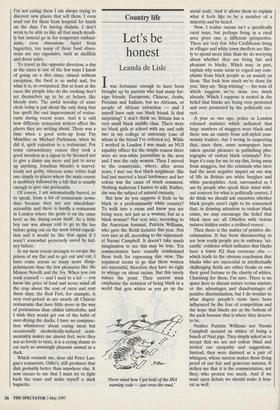Country life
Let's be honest
Leanda de Lisle
Iwas fortunate enough to have been brought up by parents who had many for- eign friends: Europeans, Chinese, Arabs, Persians and Indians, but no Africans, or people of African extraction — and I myself have only one black friend. Is that surprising? I don't think so. Britain has a very small black middle class. There were no black girls at school with me and only two in my college at university (one of whom is the friend I've referred to). While I worked in London I was made an NUJ equality officer for the simple reason there were no non-white journalists in the area and I was the only woman. Then I moved to the countryside, where, after seven years, I met our first black neighbour. She had just married a local landowner and her colour was the cause of much comment. Nothing malicious I hasten to add. Rather, she was the subject of natural curiosity.
But how do you suppose it feels to be black in a predominantly white country? To walk into a room and know you are being seen, not just as a woman, but as a black woman? Not very nice, according to the American feminist, Patricia Williams, who gave the Reith lectures this year. Not very nice at all, according to the supermod- el Naomi Campbell. It doesn't take much imagination to see this may be true. Yet commentators have roundly condemned them both for expressing this view. The argument seems to go that these women are successful, therefore they have no right to whinge on about racism. But this surely misses the point. Their success must emphasise the isolation of being black in a world that gets whiter as you go up the Never mind how I got hold of the IRA warning code — just cross the mad.' social scale. And it allows them to explain what it feels like to be a member of a minority and be heard.
Now, I realise racism isn't a specifically rural issue, but perhaps living in a rural area gives one a different perspective. There are very few Afro Caribbeans living in villages and white town dwellers are like- ly to spend more time than we do worrying about whether they are being fair and pleasant to blacks. Which may, in part, explain why some seem to regard any com- plaints from black people as an assault on them. 'But look how much we've done for you,' they say. 'Stop whining' — the tone of which suggests we've done too much already. Which I suppose is rooted in the belief that blacks are being over protected and over promoted by the politically cor- rect.
A year or two ago, police in London released statistics which indicated that large numbers of muggers were black and there was an outcry from self-styled com- munity leaders. Am I wrong in suspecting that, since then, some newspapers have taken special pleasure in publishing pho- tographs of violent black criminals? Per- haps it's easy for me to say this, living away from muggers, but the criminals who have had the most negative impact on our way of life in Britain are white burglars and white paedophiles. And, surrounded as I am by people who speak their mind with- out concern for what is politically correct, I do think we should ask ourselves whether black people aren't right to be concerned that, in drawing attention to violent black crime, we may encourage the belief that black men are all Othellos with vicious natures hidden under a civilised veneer.
Then there is the matter of positive dis- crimination. It has been disconcerting to see how ready people are to embrace 'sci- entific' evidence which indicates that blacks have a lower IQ than everyone else which leads to the obvious conclusion that blacks who are successful in intellectually challenging fields are either freaks or owe their good fortune to the charity of whites. Charming for them, I'm sure. There is no space here to discuss nature versus nurture or the advantages and disadvantages of positive discrimination, but I do wonder to what degree people's views have been influenced by the fear of competition and the hope that blacks are at the bottom of the pack because that is where they deserve to be.
Neither Patricia Williams nor Naomi Campbell accused us whites of being a bunch of Nazi pigs. They simply asked us to accept that we are not colour blind and invited our sympathy and suggestions. Instead, they were damned as a pair of whingers, whose success makes them living proof of our fair and generous natures. It strikes me that it is the commentators, not they, who protest too much. And if we want open debate we should make it hon- est as well.


































































 Previous page
Previous page